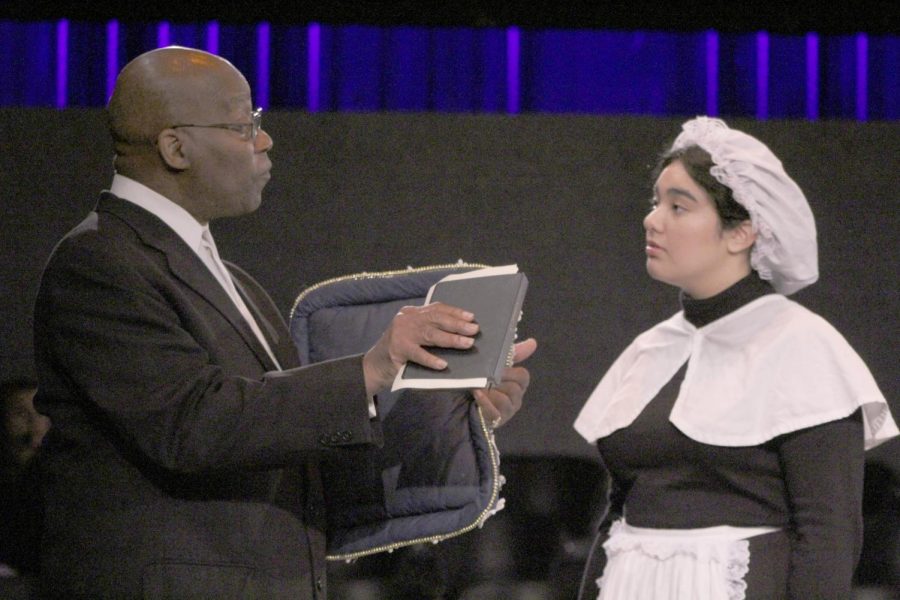Energetic, funny production transforms Knox Center stage
Intimate setting highlights story of personal growth
Elizabeth Donderstock (right), played by Jelaine Maestas, speaks with Rev. Tollhouse (left), played by Elijah Sterling, during a rehearsal of “The Book of Liz,” which concluded its run in the Knox Center this past weekend.
Dec 11, 2019
A short-but-sweet drama department showing of a uniquely produced show shared a hysterical story of change and exploration at the Knox Center for four performances this past weekend, Thursday through Sunday.
In a move that brought audiences a new experience, the play was performed in a curtained off square on stage with seats surrounding the acting space on stage.
Every emotion that an actor shared in the space was seen from multiple angles with audience members in every direction.
With a lead actress drenched in sweat and bouncing with energy, the show’s comedic vein flowed easily into many laughs from the audience.
The drama department’s “The Book of Liz” follows the story of sister Elizabeth Donderstock, played with infectious enthusiasm by Jelaine Maestas.
The show follows Elizabeth as she leaves her home of Clusterhaven and tries to live life on her own while the church goes through hardships without her producing their cheese balls to sell. As she tackles life’s challenges, it becomes increasingly clear that many of the successes she strives for are outside of her moral boundaries.
Her world is turned upside down as a new church member, brother Nathaniel Brightbee, performed affectingly by Daniel Morales, joins her Amish-like religious community called Squeamish. He convinces Rev. Tollhouse, firmly played by Elijah Sterling, to let him take over the community’s cheese balls, which is their main source of income.
This comes as a heavy blow to sister Elizabeth, who is told she will no longer be in charge of making cheese balls, but instead is told to collect chives. After a back and forth on the tumultuous changes with sister Constance Butterworth, played emphatically by Pascha McAlister, Elizabeth decides to run away from the community.
In the outside world, her naivety and good heart helps her befriend a worker dressed as Mr. Peanut. Her new friend is a Ukranian woman named Oxana, played energetically by Jade Rohrsetzer. She and her husband Yvone, played delightfully by Gustavo Carmargos, take in Elizabeth as they help her get a job at a pilgrim styled restaurant.
The new job exposes Elizabeth to a world of dysfunctional alcoholics working in the service sector and gives her some fresh perspective. As she climbs the ladder of success at work, her new world is familiarly shattered.
She loses her new home as her friends are deported and changes in her work uniform go against her modest religious beliefs for appropriate clothing. Meanwhile, her religious community had been going through dire financial times as they can no longer produce cheese balls of the same quality they had under sister Elizabeth’s guidance. By show’s end, Elizabeth returns home to Rev. Tollhouse with new self-worth and a list of demands, which he gladly accepts.
The play is filled with comedy that hit great strides when everyone’s timing syncs and audiences are exposed to outrageous dialogue delivered succinctly in character.
In some of the slower moments that were meant to establish the emotional relationships and boundaries between characters, buying into a suspension of disbelief feels difficult.
The use of the stage as seating for the audience is an incredible component that allows for a unique and energizing experience. As scenes play out, the actors change directions giving audiences multiple angles from which to appreciate the range of emotions exchanged in such an intimate space.
The audience is put right up against the actors for an incredibly unique theatrical experience. The actors literally share the stage bringing to life “The Story of Liz” breaking out of her familiar surroundings and exploring the world outside her religious group.
As Maestas brings a childlike innocence to every scene, her partners quickly respond with great supportive energy. Playing the titular character with a chipper attitude at all times allows for the scenes outside of her own to feed into the overall story.
With that energy, the production, directed by drama professor Angelina LaBarre, remains light-hearted and rarely skipped a beat.
In scenes where members of the Squeamish community exchange difficulties, the limelight is stolen by Pascha McAlister. Her voice reverberates throughout the small space as she roars through her lines with fierce emotion.
The energy spread to her scene partners and they have no choice but to bring an equal amount of strength to their lines.
The show is a great exercise in absurdism, with every scene providing its own encapsulated comedy sketch and a new lesson for Elizabeth. When at its best, the show seems to flow seamlessly into a gut-wrenching laugh break for the audience. However, these highs are not sustained as the strength of the production lies in its constant moving pieces and scene partners.
By having a mixture of fortune and misery, the show is able to depict life’s constant fluctuations but reminds audiences that there is humor to be found in every situation.
Most scenes create a joyous atmosphere that quickly turns into disappointment for Elizabeth and Maestas, who still perform with the sweet demeanor expected from a religious sister. When one scene ends, the next usually takes place jumping with energy from the last.
However, there were a few times when actors missed their queue for an exit or burst into a monologue as theater tech emoted in confusion on the stage.
The show’s limited run did not stop it from throwing a plethora of well-timed and executed humor at audiences.



